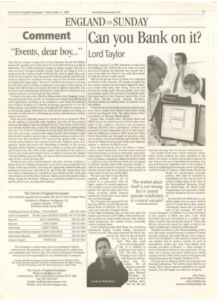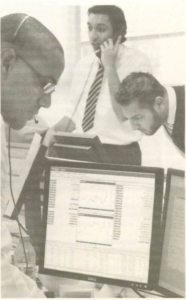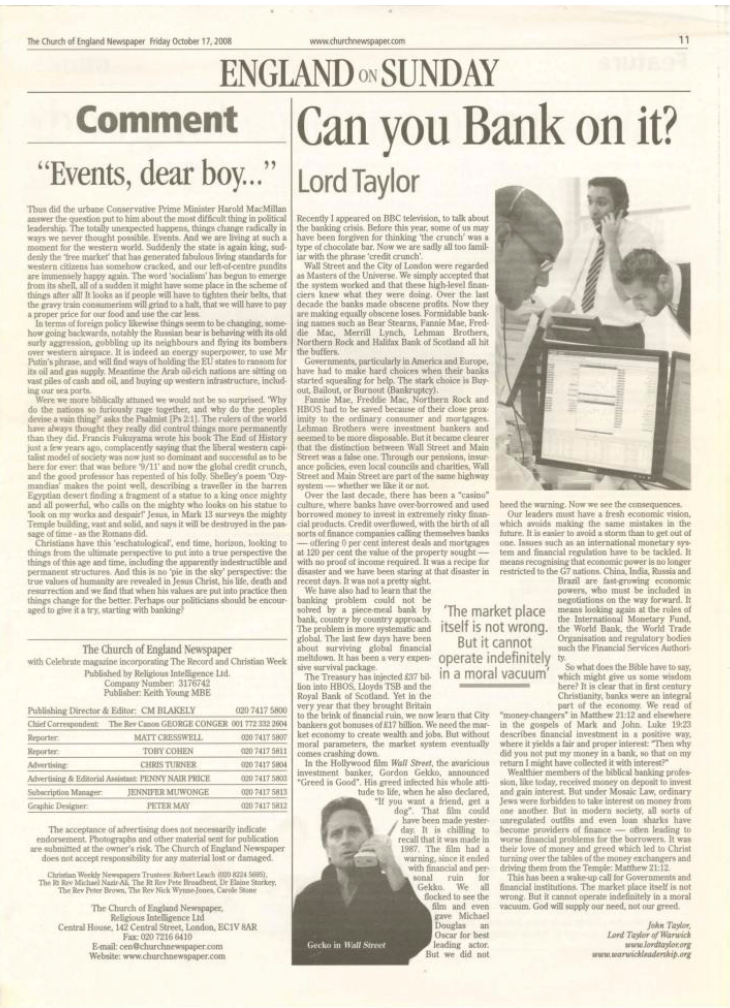Church of England Article By Lord Taylor of Warwick
 Recently I appeared on BBC television, to talk about the banking crisis. Before this year, some of us may have been forgiven for thinking ‘the crunch’ was a type of chocolate bar. Now we are sadly all too familiar with the phrase ‘credit crunch‘.
Recently I appeared on BBC television, to talk about the banking crisis. Before this year, some of us may have been forgiven for thinking ‘the crunch’ was a type of chocolate bar. Now we are sadly all too familiar with the phrase ‘credit crunch‘.
Wall Street and the City of London were regarded as Masters of the Universe. We simply accepted that the system worked and that these high-level financiers knew what they were doing. Over the last decade the banks made obscene profits. Now they are making equally obscene loses. Formidable banking names such as Bear Stearns, Fannie Mae, Freddie Mac, Merrill Lynch, Lehman Brothers, Northern Rock and Halifax Bank of Scotland all hit the buffers.
Governments, particularly in America and Europe, have had to make hard choices when their banks started squealing for help. The stark choice is Buyout, Bailout, or Burnout (Bankruptcy).
Fannie Mae, Freddie Mac, Northern Rock and HBOS had to be saved because of their close proximity to the ordinary consumer and mortgages. Lehman Brothers were investment bankers and seemed to be more disposable. But it became clearer that the distinction between Wall Street and Main Street was a false one. Through our pensions, insurance policies, even local councils and charities, Wall Street and Main Street are part of the same highway system – whether we like it or not.
Over the last decade, there has been a “casino” culture, where banks have over-borrowed and used borrowed money to invest in extremely risky financial products. Credit overflowed, with the birth of all sorts of finance companies calling themselves banks – offering 0 percent interest deals arid mortgages at 120 percent the value of the property sought – with no proof of income required. It was a recipe for disaster and we have been staring at that disaster in recent days. It was not a pretty sight.
We have also had to learn that the banking problem could not be solved by a piecemeal bank by bank, country by country approach. The problem is more systematic and global. The last few days have been about surviving global financial meltdown. It has been a very expensive survival package.
The Treasury has injected £37 billion into HBOS, Lloyds TSB and the Royal Bank of Scotland. Yet in the very year that they brought Britain to the brink of financial ruin, we now learn that City bankers got bonuses of £17 billion. We need the market economy to create wealth and jobs. But without moral parameters, the market system eventually comes crashing down.
 In the Hollywood film Wall Street, the avaricious investment banker, Gordon Gekko, announced “Greed is Good”. His greed infected his whole attitude to life, when he also declared, “If you want a friend, get a dog”. That film could have been made yesterday. It is chilling to recall that it was made in 1987. The film had a warning, since it ended with financial and personal ruin for Gekko. We all flocked to see the film and even gave Michael Douglas an Oscar for best leading actor. But we did not heed the warning. Now we see the consequences.
In the Hollywood film Wall Street, the avaricious investment banker, Gordon Gekko, announced “Greed is Good”. His greed infected his whole attitude to life, when he also declared, “If you want a friend, get a dog”. That film could have been made yesterday. It is chilling to recall that it was made in 1987. The film had a warning, since it ended with financial and personal ruin for Gekko. We all flocked to see the film and even gave Michael Douglas an Oscar for best leading actor. But we did not heed the warning. Now we see the consequences.
Our leaders must have a fresh economic vision, which avoids making the same mistakes in the future. It is easier to avoid a storm than to get out of one. Issues such as an international monetary system and financial regulation have to be tackled. It means recognising that economic power is no longer restricted to the G7 nations. China, India, Russia, and Brazil are fast-growing economic powers, who must be included in negotiations on the way forward. It means looking again at the roles of the International Monetary Fund, the World Bank, the World Trade Organisation and regulatory bodies such the Financial Services Authority.
So what does the Bible have to say, which might give us some wisdom here? It is clear that in first century Christianity, banks were an integral part of the economy We read of “money-changers” in Matthew 21:12 and elsewhere in the gospels of Mark and John. Luke 19:23 describes financial investment in a positive way, where it yields a fair and proper interest “Then why did you not put my money in a bank, so that on my return I might have collected it with interest?”
 Wealthier members of the biblical banking profession, like today, received money on deposit to invest and gain interest. But under Mosaic Law, ordinary Jews were forbidden to take interest on money from one another. But in modern society, all sorts of unregulated outfits and even loan sharks have become providers of finance – often leading to worse financial problems for the borrowers. It was their love of money and greed which led to Christ turning over the tables of the money exchangers and driving them from the Temple: Matthew 21:12.
Wealthier members of the biblical banking profession, like today, received money on deposit to invest and gain interest. But under Mosaic Law, ordinary Jews were forbidden to take interest on money from one another. But in modern society, all sorts of unregulated outfits and even loan sharks have become providers of finance – often leading to worse financial problems for the borrowers. It was their love of money and greed which led to Christ turning over the tables of the money exchangers and driving them from the Temple: Matthew 21:12.
This has been a wake-up call for Governments and Financial Institutions. The marketplace itself is not wrong. But it cannot operate indefinitely in a moral vacuum. God will supply our need, not our greed.
